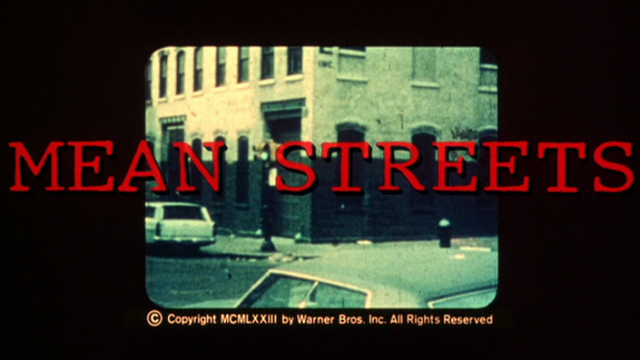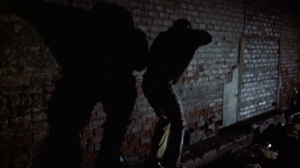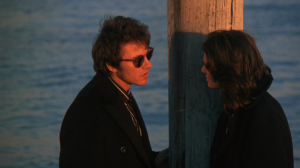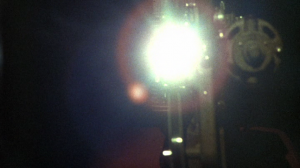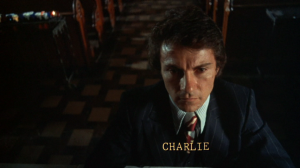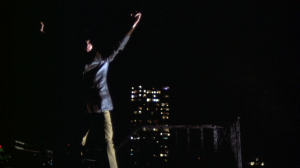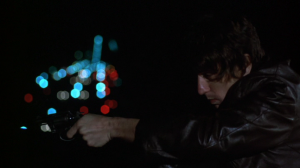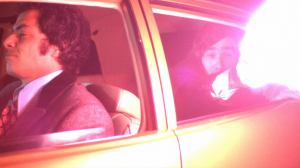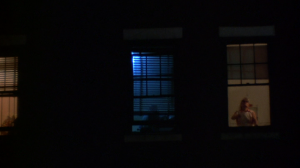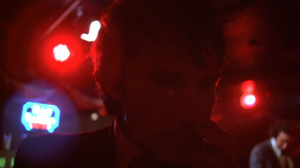It’s a new year, so what better way to start it off than a new phase in the Scorsese Experience? Today, we’ll be diving into to Scorsese’s first bona fide classic, and — well, I hope I don’t lose what little credibility I have as a Scorsese scholar when I say that I can’t entirely agree with that assessment of Mean Streets.
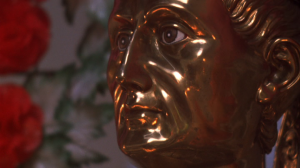
Don’t get me wrong — it’s not bad. A lot of the time, it brushes right up against greatness. But it’s still an aimless, surprisingly dull movie, that doesn’t show the kind of growththat you’d expect from the film that put Scorsese on the world cinema stage. My experience with it was kind of a lateral movement from it to Who’s That Knocking On My Door. Somehow,this professionally-mounted, nationally-released actually ended up looking cheaper than the one that was funded by the seat of its pants. The editing is a lot sharper of course, but the grainy, muddy-colored filmstock is a major step down from the beautiful clarity of its black and white companion piece. My colleague The Narrator often says “the actors are in focus” when he’s fishing for the faintest possible phrase, but this may be the first movie I’ve ever seen where that actually wasn’t the case. 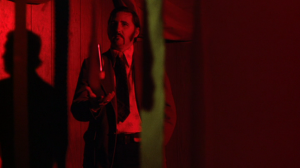 I don’t know, I imagine a lot of my reaction comes from context. In 1973, no one had seen anything like this before. But in the year 2014, Scorsese we’ve seen Scorsese hone his style to near-perfection, and other directors have absorbed it into the film grammar. Pauline Kael and Roger Ebert both praise Mean Streets’ unique approach to violence. In this movie, fights erupt out of nowhere, and there’s no more choreography to the fights themselves than there is to the setup. The trouble is, that’s also true of Taxi Driver — and Fight Club and 12 Years a Slave and dozens of other movies. Today’s innovation is tomorrow’s standard. Scorsese was nice enough to throw in a reminder of the old-fashioned style of movie brawling for future generations, though — the characters watch The Searchers at one point and we get to see the fight between Jeffrey Hunter and his romantic rival.
I don’t know, I imagine a lot of my reaction comes from context. In 1973, no one had seen anything like this before. But in the year 2014, Scorsese we’ve seen Scorsese hone his style to near-perfection, and other directors have absorbed it into the film grammar. Pauline Kael and Roger Ebert both praise Mean Streets’ unique approach to violence. In this movie, fights erupt out of nowhere, and there’s no more choreography to the fights themselves than there is to the setup. The trouble is, that’s also true of Taxi Driver — and Fight Club and 12 Years a Slave and dozens of other movies. Today’s innovation is tomorrow’s standard. Scorsese was nice enough to throw in a reminder of the old-fashioned style of movie brawling for future generations, though — the characters watch The Searchers at one point and we get to see the fight between Jeffrey Hunter and his romantic rival.
But I’m not a total contrarian — I can still see a lot of genius in this film. It sure gets off to one heck of a start. Over a black screen, Scorsese himself intones “you don’t make up for your sins in church. You do it in the streets. You do it at home. The rest is bullshit and you know it.” And we see Harvey Keitel right where we left him at the end of Who’s That Knocking At My Door — in a dark cathedral in the heart of Little Italy. He introduces us to his favored method of penance, holding his hand over a fire while imagining it multiplied thousands of times over in hell if he doesn’t repent. Then we see him fall backwards onto his bed and boom, boom boom, boom! Ronnie Spector’s “Be My Baby” comes thundering in.
After that, we’re in a darkened screening room as a projector whirs to life to show us home movies of Harvey Keitel as Charlie screwing around with his friends and showing off his neighborhood. It’s a brilliant touch recycled from It’s Not Just You, Murray! and it makes it clear what kind of movie we’re getting. It’s a home movie with actors, a slice of life, an American ethnography, an autobiography, a memory, and all like such as. The opening is exhilarating, and the energy doesn’t let up as Scorsese introduces us to his players. He does so with another experimental flourish, showing them in their element — Charlie in church, Tony at his bar, Robert DeNiro’s Johnny Boy causing trouble, Michael getting into trouble — and then freezing time around them while their names flash up. It’s efficient, it’s memorable, so of course it’s been copied many times over from Romeo+Juliet (that’s bad) to Trainspotting (that’s good!) and countless others (can I go now?).
But that momentum doesn’t hold out for long. Like Who’s That Knocking At My Door, the story structure is loose, or, to use the old show-biz term, one darn thing after another. Trouble is, those things aren’t quite as interesting this time around — for the first hour, at least, there’s nothing quite as unforgettable as the mountain in New Jersey or JR’s Doors-aided sex fantasy. Of course, Mean Streets has one very big point in its favor that Knocking doesn’t — Robert De Travis-Bickle-Jake-La-Motta-Rupert-Pupkin Niro. 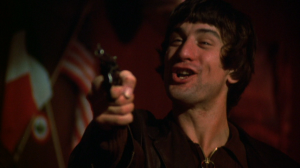 It was the beginning of a beautiful friendship is what I’m saying. DeNiro’s performance here is miles away from the raspy, impeccably cool style he would bring to an army of future roles, unflappable professionals and raving madmen alike. And after years of phoning it in playing warmed-over versions of that shtick in movies like The Big Wedding or The Wedding Bride or whatever he’s been up to lately, it’s a real shock to see him so young and energized again. Johnny Boy comes from a different world than the characters of Heat and Once Upon a Time in America, or even Taxi Driver. He’s not as scary as Travis Bickle, but his brand of madness — or stupidity, it’s hard to tell sometimes — is much more extraverted. He’s an energetic puppy dog of a man, and not the kind who slinks in the corner when he knows he’s in trouble — Johnny Boy couldn’t care less. He’s in debt up past his ears; a better metaphor might be that he’s buried six feet deep. This is the main conflict, such as it is, in Mean Streets. Charlie wants to be a good friend to Johnny Boy, and to keep him out of trouble. But Johnny Boy refuses to move from the path leading to his destruction.
It was the beginning of a beautiful friendship is what I’m saying. DeNiro’s performance here is miles away from the raspy, impeccably cool style he would bring to an army of future roles, unflappable professionals and raving madmen alike. And after years of phoning it in playing warmed-over versions of that shtick in movies like The Big Wedding or The Wedding Bride or whatever he’s been up to lately, it’s a real shock to see him so young and energized again. Johnny Boy comes from a different world than the characters of Heat and Once Upon a Time in America, or even Taxi Driver. He’s not as scary as Travis Bickle, but his brand of madness — or stupidity, it’s hard to tell sometimes — is much more extraverted. He’s an energetic puppy dog of a man, and not the kind who slinks in the corner when he knows he’s in trouble — Johnny Boy couldn’t care less. He’s in debt up past his ears; a better metaphor might be that he’s buried six feet deep. This is the main conflict, such as it is, in Mean Streets. Charlie wants to be a good friend to Johnny Boy, and to keep him out of trouble. But Johnny Boy refuses to move from the path leading to his destruction.
Once Johnny Boy starts dancing obliviously towards his doom, the movie begins to come into focus. Charlie gets involved with his sister, Teresa, right as his mob boss uncle Giovanni tells him to stay away from the family. Charlie apparently has some loyalties above God, love, and friendship, because he starts pushing them away, just when it looks like Johnny Boy may need him most.
The turning point from pretty-good to just-about-great comes in a striking, operatic sequence of Johnny Boy boozed out of his mind (or just being himself again, it’s hard to tell) and firing his revolver off in the middle of the night, yelling about shooting the lights out of the Chrysler Building. Charlie Boy has to talk him down, and tries to convince to start taking his life seriously as the walk through the churchyard. Johnny Boy still believes he can float on through life, though — he doesn’t seem to notice that he’s literally stretched out on a grave. It’s an indelibly moody scene, especially if you’re like me and prefer your symbolism a little on the obvious side. 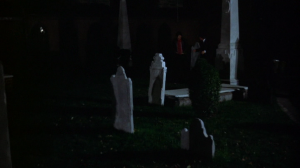 It’s certainly obvious to everyone but Johnny Boy that he’s not long for this world. Scorsese starts ratcheting up the tension to a fever pitch. There’s no more plotless, nostalgic screwing around — every scene builds on top of the other until the bloody ending is inevitable. Michael the fence is about through with Johnny Boy’s refusal to pay back his loans (which are in the thousands by now) by this point, and Charlie gives him some money to keep Michael quiet for a bit. But the first thing Johnny Boy does is slam a good chunk of that cash on the bar. It’s an implicit insult, but Johnny Boy, for reasons, as always, known only to him, decides Michael could use some good explicit insulting: “So, I can’t borrow no money from nobody no more, right? So who would that leave me to borrow money from but you? I borrow money from you, because you’re the only jerk-off around here who I can borrow money from without payin’ back, right? You know, ’cause that’s what you are, that’s what I think of you: a jerk-off. You’re a fucking jerk-off!”
It’s certainly obvious to everyone but Johnny Boy that he’s not long for this world. Scorsese starts ratcheting up the tension to a fever pitch. There’s no more plotless, nostalgic screwing around — every scene builds on top of the other until the bloody ending is inevitable. Michael the fence is about through with Johnny Boy’s refusal to pay back his loans (which are in the thousands by now) by this point, and Charlie gives him some money to keep Michael quiet for a bit. But the first thing Johnny Boy does is slam a good chunk of that cash on the bar. It’s an implicit insult, but Johnny Boy, for reasons, as always, known only to him, decides Michael could use some good explicit insulting: “So, I can’t borrow no money from nobody no more, right? So who would that leave me to borrow money from but you? I borrow money from you, because you’re the only jerk-off around here who I can borrow money from without payin’ back, right? You know, ’cause that’s what you are, that’s what I think of you: a jerk-off. You’re a fucking jerk-off!” 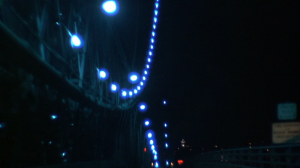 The streets start to look a lot meaner as Charlie drives Johnny Boy and Teresa through New York. Michael drives up to them in the darkness, and the characters’ creator becomes their destroyer — Martin Scorsese himself appears as the gunman who shoots Johnny Boy through the neck. After that, mere anarchy is loosed upon the film, and the camera and the car both start to swerve madly out of control.
The streets start to look a lot meaner as Charlie drives Johnny Boy and Teresa through New York. Michael drives up to them in the darkness, and the characters’ creator becomes their destroyer — Martin Scorsese himself appears as the gunman who shoots Johnny Boy through the neck. After that, mere anarchy is loosed upon the film, and the camera and the car both start to swerve madly out of control.
Scorsese puts the viewer right in Charlie’s position, not with POV shots, but in capturing the subjective panic of the moment. In fact, we don’t stay with Charlie at all. Instead we get scenes of characters miles away, as Uncle Giovanni gives his silent approval and the dancer Charlie rejected sits alone in her dressing room. And since Charlie is Scorsese as much as the gunman is, his minds rushes back to the movies, and we see a few seconds of a corpse falling out of car in The Big Heat. But this isn’t cleaned-up, Code-approved violence. This is the seventies, man, and that flashback is inspired by a horrific shot of Teresa’s bloody hand penetrating the windshield. It looks like Charlie may be dead, but Scorsese’s camera is done with him. Instead, we leave him there and go to New York and the windows of Little Italy tenements. It was never really about him. It was about the city.
As much as it is about Charlie, though, it’s about the struggle between his everyday life and his Catholic convictions, and this is another case where I have to differ from the accepted interpretation of Mean Streets, though that may just be because I’m biased by my own convictions. I’m especially uncomfortable with Roger Ebert’s problematizing of Charlie’s faith, especially when he says Keitel’s character “takes his Catholicism literally,” as if that wasn’t a standard part of being a Catholic. Looking at the movie — and especially that first line from Scorsese himself — I’m more inclined to see Charlie’s problem as not taking his moral code seriously enough. Charlie’s attempts at penance might not come from the church-approved Hail Marys and Our Fathers, but they’re still ritual bullshit. He dances with the black stripper in Tony’s bar, and feeling guilty (even though he probably shouldn’t), does his personal sacrament with the flame and immediately goes back to being a thug. Pauline Kael calls it “instant absolution” and it reminded me a little of the dead man in The Inferno who believed he had been absolved of his sins because he confessed them beforehand. Charlie is trying to do good, but he has the wrong idea about what that is — more loyal to the mob boss than the Holy Fool, or, to quote Ebert again, “Although he is an apprentice gangster involved with men who steal, kill and sell drugs, Charlie’s guilt centers on sex. Impurity is the real sin; the other stuff is business.”
Scorsese spent this film, and many from then on, delving deep into his past for insights on what makes him, his neighborhood, and people in general tick. In his next film, he would abandon his pretenses of narrative and point his camera right at his family for an unfiltered experience with the Scorseses. Up next: Italianamerican

